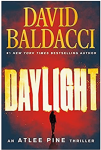 Daylight is a troubling read. Less entertainment and pleasure and more thought provocation and mental prodding. My feeling is that it is a lukewarm example of David Baldacci.
Daylight is a troubling read. Less entertainment and pleasure and more thought provocation and mental prodding. My feeling is that it is a lukewarm example of David Baldacci.
Synopsis
FBI Agent Atlee Pine’s search for her sister Mercy clashes with military investigator John Puller’s high-stakes case, leading them both deep into a global conspiracy — from which neither of them will escape unscathed.
For many long years, Atlee Pine was tormented by uncertainty after her twin sister, Mercy, was abducted at the age of six and never seen again. Now, just as Atlee is pressured to end her investigation into Mercy’s disappearance, she finally gets her most promising breakthrough yet: the identity of her sister’s kidnapper, Ito Vincenzo.
With time running out, Atlee and her assistant Carol Blum race to Vincenzo’s last known location in Trenton, New Jersey — and unknowingly stumble straight into John Puller’s case, blowing his arrest during a drug ring investigation involving a military installation.
Stunningly, Pine and Puller’s joint investigation uncovers a connection between Vincenzo’s family and a breathtaking scheme that strikes at the very heart of global democracy. Peeling back the layers of deceit, lies and cover-ups, Atlee finally discovers the truth about what happened to Mercy. And that truth will shock Pine to her very core.
Richard comments
Daylight is less than Baldacci at his best. The book is well written as expected by a best selling author of Baldacci’s level. The book is classic Baldacci to a point. The plot is very good to a point. The story and its development is very good to a point. So what is ‘the point?’
Somewhere, near three quarters of the way through the book, readers may find the book becomes confusing. What’s the story? A search for Mercy, the heroine Atlee’s lost sister? A drug bust story? A high level politicians blackmail plot? A convoluted map of mobsters and their families from days gone by?
A reader can become quite lost in the convolutions and intricacies in the story. For this reader, it was bothersome enough to divert and lose reading focus. The confusion grew as I tried to keep track of the various ‘villains’ of the story. Which ones were the priority ones? The drug dealers, the crime family, the extortionists, the corrupt politicians? Who was I to follow?
The confusion and complications detract from the simplicity of a clean, clear narrative and this messiness culminates in an ending that is unclear? Is Mercy still alive? Is her father building a new ‘cave’ for her imprisonment?
Perhaps Baldacci is using the confusion and disorder as intention tools to cause readers discomfort and inspire questions rather than present answers. If that is his intent, he has succeeded. However, I am a reader who reads Baldacci types of books for entertainment and pleasure, not for thought provocation.
In my eyes, Daylight is a discomforting read.





